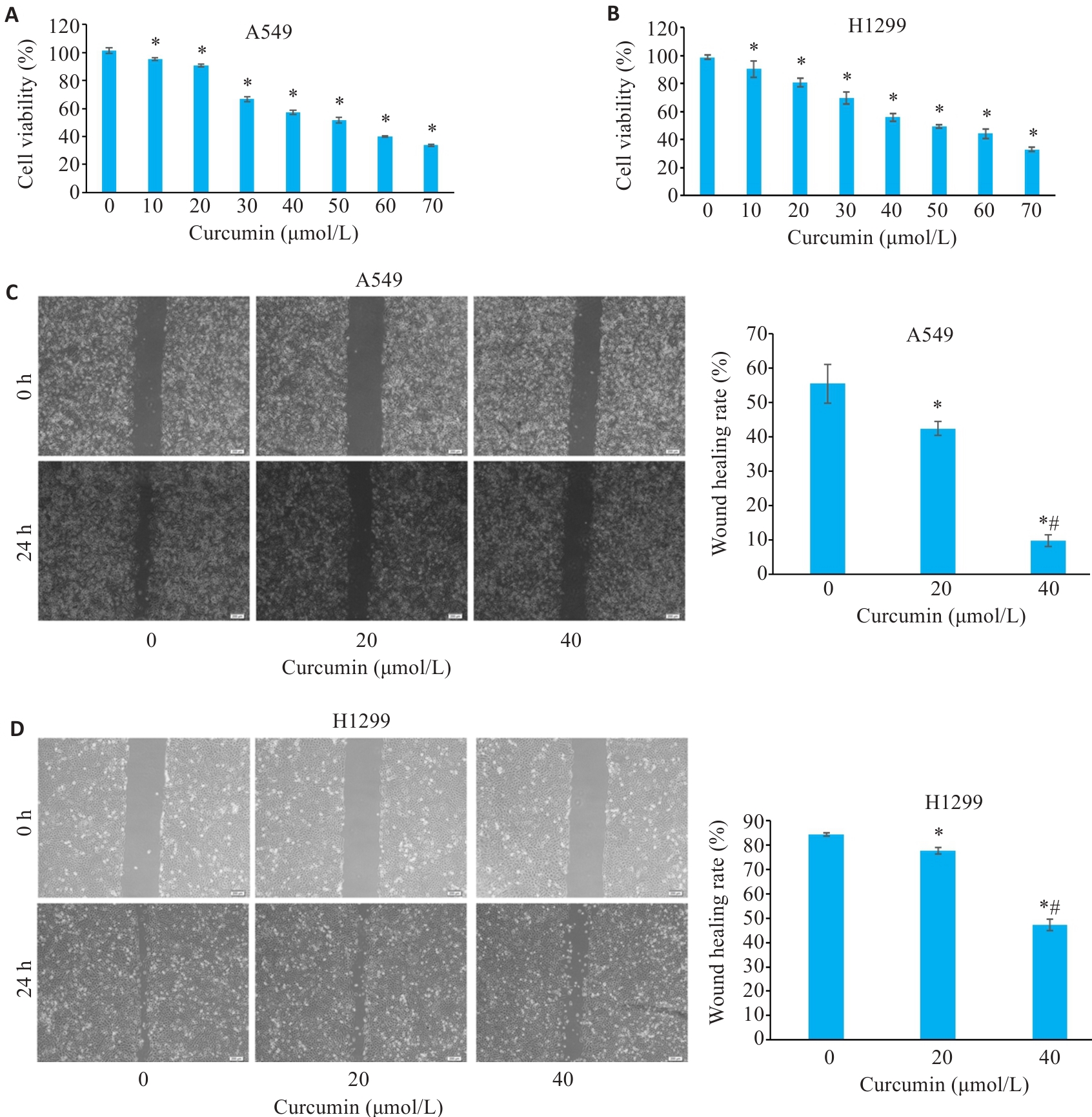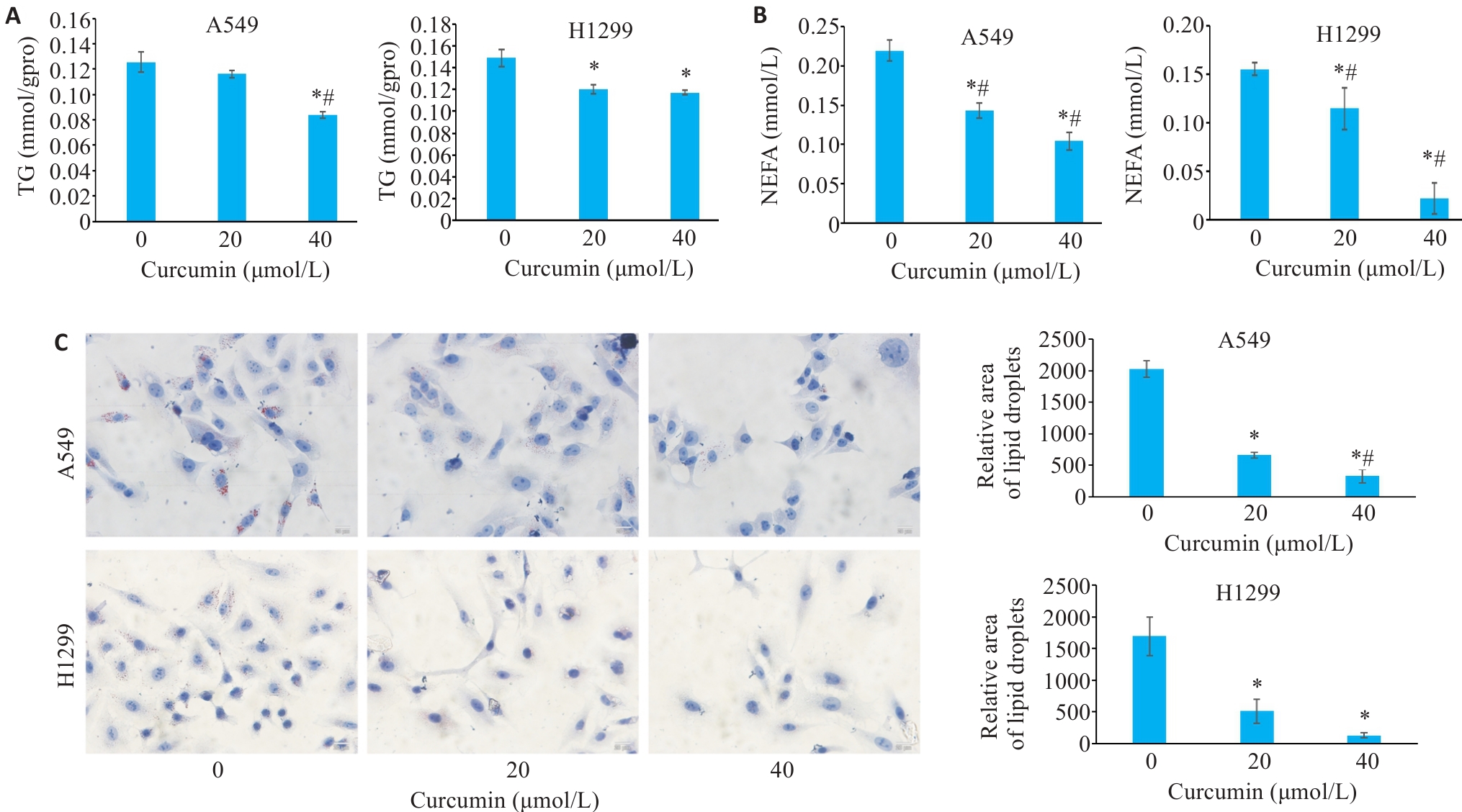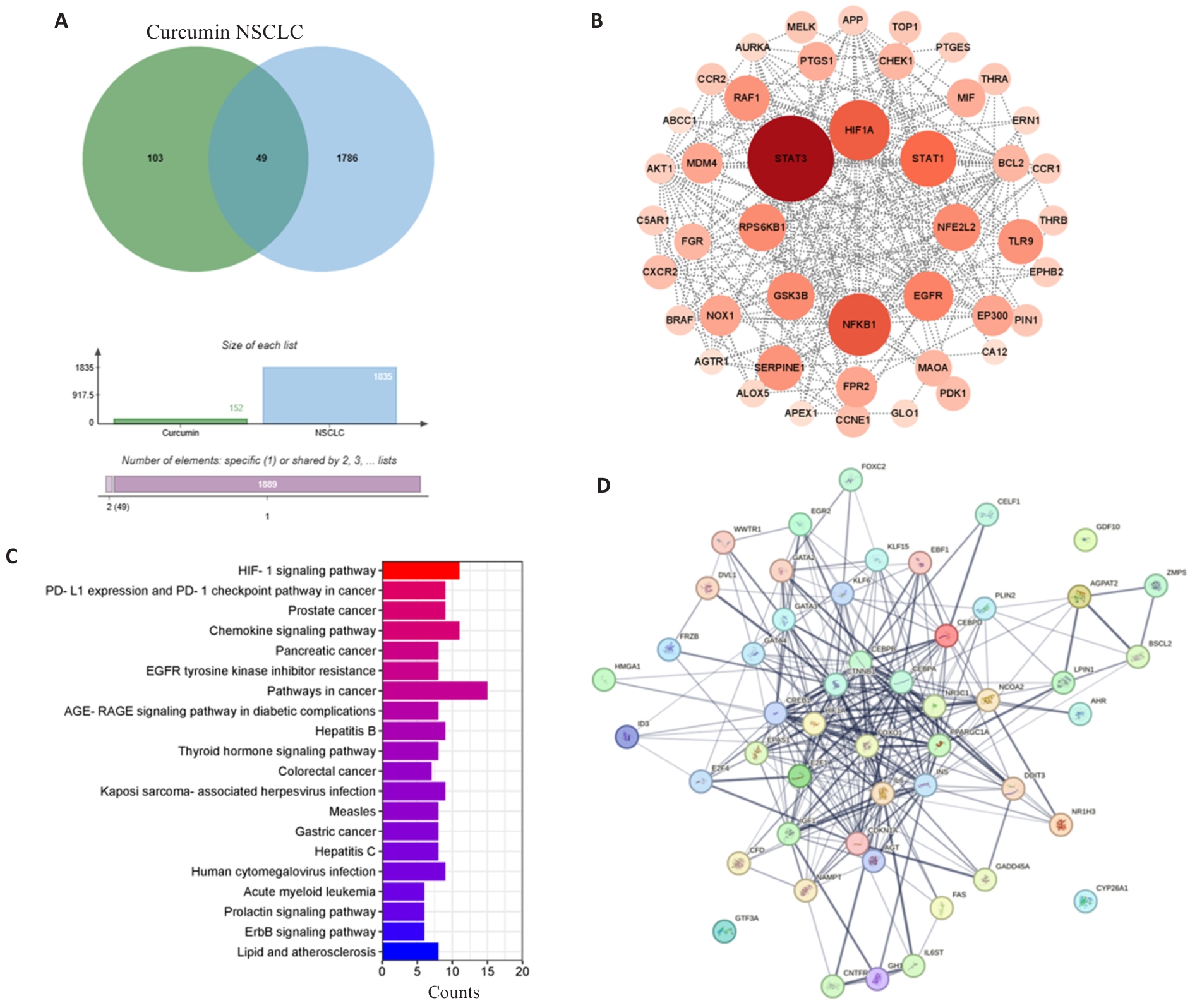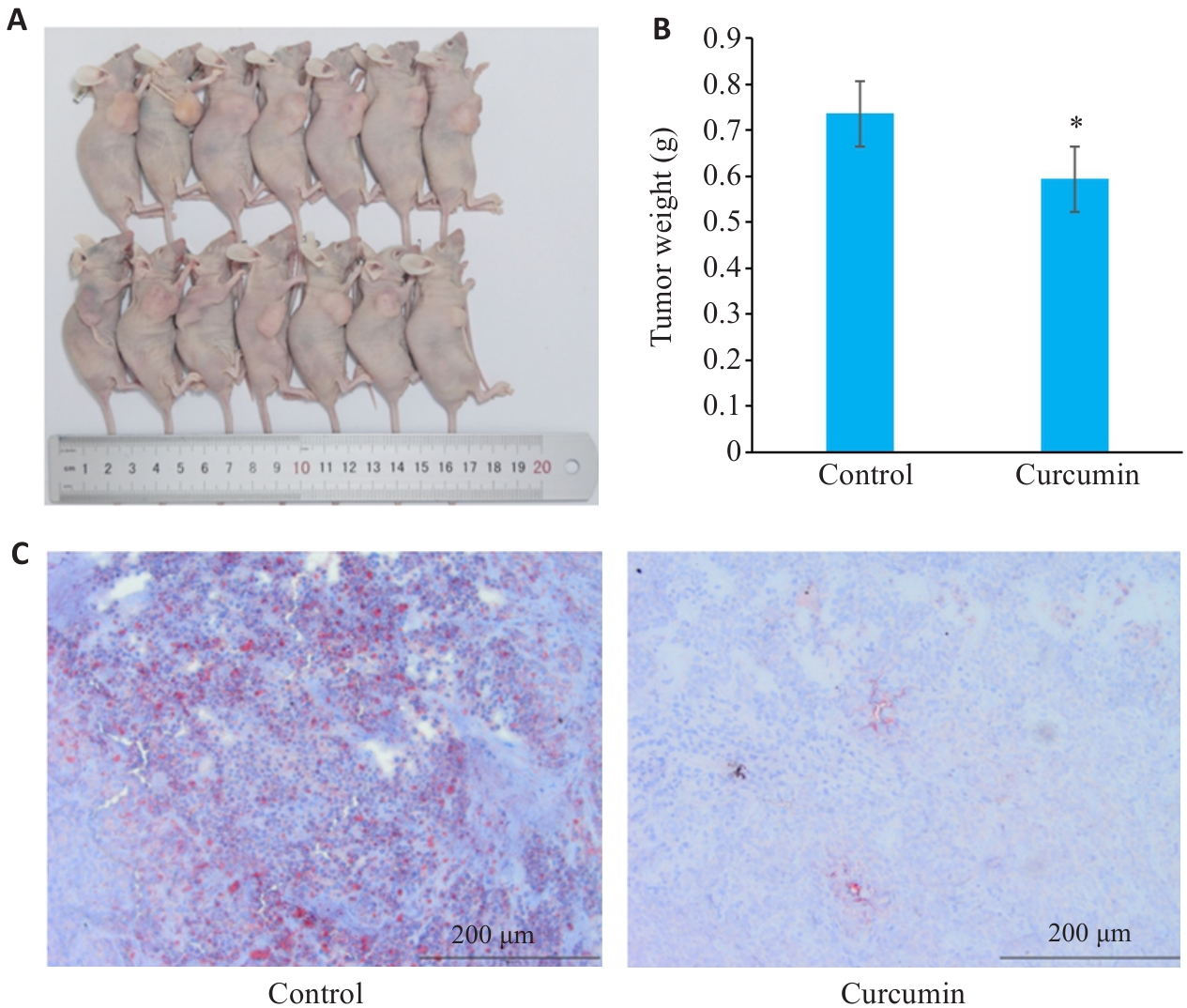Journal of Southern Medical University ›› 2025, Vol. 45 ›› Issue (5): 1039-1046.doi: 10.12122/j.issn.1673-4254.2025.05.17
Previous Articles Next Articles
Dandan LI1,2( ), Jiaxin CHU1,2, Yan YAN3, Wenjun XU4, Xingchun ZHU4, Yun SUN4, Haofeng DING4, Li REN5, Bo ZHU1,2(
), Jiaxin CHU1,2, Yan YAN3, Wenjun XU4, Xingchun ZHU4, Yun SUN4, Haofeng DING4, Li REN5, Bo ZHU1,2( )
)
Received:2024-08-09
Online:2025-05-20
Published:2025-05-23
Contact:
Bo ZHU
E-mail:18756712655@163.com;35736791@qq.com
Dandan LI, Jiaxin CHU, Yan YAN, Wenjun XU, Xingchun ZHU, Yun SUN, Haofeng DING, Li REN, Bo ZHU. Curcumin inhibits lipid metabolism in non-small cell lung cancer by downregulating the HIF-1α pathway[J]. Journal of Southern Medical University, 2025, 45(5): 1039-1046.
Add to citation manager EndNote|Ris|BibTeX
URL: https://www.j-smu.com/EN/10.12122/j.issn.1673-4254.2025.05.17

Fig.1 Inhibitory effect of curcumin on proliferation of A549 and H1299 cells. A, B: Effect of curcumin on viability of A549 and H1299 cells. C, D: Wound healing assay of curcumin-treated A549 and H1299 cells. *P<0.05 vs Curcumin 0; #P<0.05 vs Curcumin 20..

Fig.3 Effect of curcumin on lipid metabolism in A549 and H1299 cells. A: Curcumin lowers TG content in A549 and H1299 cells. B: Curcumin lowers NEFA content in A549 and H1299 cells. C: Curcumin reduces lipid drops in A549 and H1299 cells. *P<0.05 vs Curcumin 0; #P<0.05 vs Curcumin 20.

Fig.5 Results of network pharmacological analysis. A: Venn diagram of NSCLC gene-curcumin target genes. B: PPI network diagram of NSCLC gene-curcumin target genes. C: KEGG enriched pathways for the intersection targets of NSCLC and Curcumin. D: PPI network diagram of adipogenesis.

Fig.7 Effect of curcumin on growth of A549 xenografts in nude mice. A, B: Changes in tumor weight in the nude mice. C: Effect of curcumin on lipid droplets in the tumor cells. *P<0.05 vs Control.
| 1 | Siegel RL, Miller KD, Wagle NS, et al. Cancer statistics, 2023[J]. CA A Cancer J Clinicians, 2023, 73(1): 17-48. |
| 2 | Chen PX, Liu YH, Wen YK, et al. Non-small cell lung cancer in China[J]. Cancer Commun, 2022, 42(10): 937-70. |
| 3 | Bian X, Liu R, Meng Y, et al. Lipid metabolism and cancer[J]. J Exp Med, 2021, 218(1). |
| 4 | Yin Y, He MQ, Huang YJ, et al. Transcriptomic analysis identifies CYP27A1 as a diagnostic marker for the prognosis and immunity in lung adenocarcinoma[J]. BMC Immunol, 2023, 24(1): 37. |
| 5 | Quispe C, Herrera-Bravo J, Javed Z, et al. Therapeutic applications of curcumin in diabetes: a review and perspective[J]. Biomed Res Int, 2022, 2022: 1375892. |
| 6 | Li XS, Zhu RG, Jiang H, et al. Autophagy enhanced by curcumin ameliorates inflammation in atherogenesis via the TFEB-P300-BRD4 axis[J]. Acta Pharm Sin B, 2022, 12(5): 2280-99. |
| 7 | Tang CY, Liu JT, Yang CS, et al. Curcumin and its analogs in non-small cell lung cancer treatment: challenges and expectations[J]. Biomolecules, 2022, 12(11): 1636. |
| 8 | Ming TQ, Tao Q, Tang S, et al. Curcumin: an epigenetic regulator and its application in cancer[J]. Biomed Pharmacother, 2022, 156: 113956. |
| 9 | Ashrafizadeh M, Najafi M, Makvandi P, et al. Versatile role of curcumin and its derivatives in lung cancer therapy[J]. J Cell Physiol, 2020, 235(12): 9241-68. |
| 10 | Shan DD, Wang JM, Di QN, et al. Steatosis induced by nonylphenol in HepG2 cells and the intervention effect of curcumin[J]. Food Funct, 2022, 13(1): 327-43. |
| 11 | Wu SF, Kong XF, Sun Y, et al. FABP3 overexpression promotes vascular fibrosis in Takayasu's arteritis by enhancing fatty acid oxidation in aorta adventitial fibroblasts[J]. Rheumatology, 2022, 61(7): 3071-81. |
| 12 | Li RQ, Li XQ, Zhao J, et al. Mitochondrial STAT3 exacerbates LPS-induced sepsis by driving CPT1a-mediated fatty acid oxidation[J]. Theranostics, 2022, 12(2): 976-98. |
| 13 | Nosrati-Oskouie M, Aghili-Moghaddam NS, Sathyapalan T, et al. Impact of curcumin on fatty acid metabolism[J]. Phytother Res, 2021, 35(9): 4748-62. |
| 14 | Sung H, Ferlay J, Siegel RL, et al. Global cancer statistics 2020: GLOBOCAN estimates of incidence and mortality worldwide for 36 cancers in 185 countries[J]. CA Cancer J Clin, 2021, 71(3): 209-49. |
| 15 | Li MJ, Guo TT, Lin JY, et al. Curcumin inhibits the invasion and metastasis of triple negative breast cancer via Hedgehog/Gli1 signaling pathway[J]. J Ethnopharmacol, 2022, 283: 114689. |
| 16 | Liu CF, Rokavec M, Huang ZK, et al. Curcumin activates a ROS/KEAP1/NRF2/miR-34a/b/c cascade to suppress colorectal cancer metastasis[J]. Cell Death Differ, 2023, 30(7): 1771-85. |
| 17 | Li JT, Wei HL, Liu YG, et al. Curcumin inhibits hepatocellular carcinoma via regulating miR-21/TIMP3 axis[J]. Evid Based Complement Alternat Med, 2020, 2020: 2892917. |
| 18 | Bahrami A, Ferns GA. Effect of curcumin and its derivates on gastric cancer: molecular mechanisms[J]. Nutr Cancer, 2021, 73(9): 1553-69. |
| 19 | Guariglia M, Saba F, Rosso C, et al. Molecular mechanisms of curcumin in the pathogenesis of metabolic dysfunction associated steatotic liver disease[J]. Nutrients, 2023, 15(24): 5053. |
| 20 | Lee SC, Jee SC, Kim M, et al. Curcumin suppresses the lipid accumulation and oxidative stress induced by benzo [a] Pyrene toxicity in HepG2 cells[J]. Antioxidants, 2021, 10(8): 1314. |
| 21 | Ceja-Galicia ZA, García-Arroyo FE, Aparicio-Trejo OE, et al. Therapeutic effect of curcumin on 5/6Nx hypertriglyceridemia: association with the improvement of renal mitochondrial β‑oxidation and lipid metabolism in kidney and liver[J]. Antioxidants, 2022, 11(11): 2195. |
| 22 | Sun T, Chen JG, Yang F, et al. Lipidomics reveals new lipid-based lung adenocarcinoma early diagnosis model[J]. EMBO Mol Med, 2024, 16(4): 854-69. |
| 23 | Schlaepfer IR, Joshi M. CPT1A-mediated fat oxidation, mechan-isms, and therapeutic potential[J]. Endocrinology, 2020, 161(2): bqz046. |
| 24 | Eltayeb K, Monica SL, Tiseo M, et al. Reprogramming of lipid metabolism in lung cancer: an overview with focus on EGFR-mutated non-small cell lung cancer[J]. Cells, 2022, 11(3): 413. |
| 25 | Ni HY, Yu L, Zhao XL, et al. Seed oil of Rosa roxburghii Tratt against non-alcoholic fatty liver disease in vivo and in vitro through PPARα/PGC-1α-mediated mitochondrial oxidative metabolism[J]. Phytomedicine, 2022, 98: 153919. |
| 26 | Zhou S, Ling X, Liang Y, et al. Cannabinoid receptor 2 plays a key role in renal fibrosis through inhibiting lipid metabolism in renal tubular cells[J]. Metabolism, 2024, 159: 155978. |
| 27 | Li DD, Ma JM, Li MJ, et al. Supplementation of Lycium barbarum polysaccharide combined with aerobic exercise ameliorates high-fat-induced nonalcoholic steatohepatitis via AMPK/PPARα/PGC-1α pathway[J]. Nutrients, 2022, 14(15): 3247. |
| 28 | Infantino V, Santarsiero A, Convertini P, et al. Cancer cell metabolism in hypoxia: role of HIF-1 as key regulator and therapeutic target[J]. Int J Mol Sci, 2021, 22(11): 5703. |
| 29 | Luo F, Lu FT, Cao JX, et al. HIF-1α inhibition promotes the efficacy of immune checkpoint blockade in the treatment of non-small cell lung cancer[J]. Cancer Lett, 2022, 531: 39-56. |
| 30 | Wu H, Zhao XF, Hochrein SM, et al. Mitochondrial dysfunction promotes the transition of precursor to terminally exhausted T cells through HIF-1α‑mediated glycolytic reprogramming[J]. Nat Commun, 2023, 14(1): 6858. |
| 31 | Kierans SJ, Fagundes RR, Malkov MI, et al. Hypoxia induces a glycolytic complex in intestinal epithelial cells independent of HIF-1-driven glycolytic gene expression[J]. Proc Natl Acad Sci USA, 2023, 120(35): e2208117120. |
| 32 | Mylonis I, Simos G, Paraskeva E. Hypoxia-inducible factors and the regulation of lipid metabolism[J]. Cells, 2019, 8(3): 214. |
| 33 | Chen Y, Xu X, Wang YR, et al. Hypoxia-induced SKA3 promoted cholangiocarcinoma progression and chemoresistance by enhancing fatty acid synthesis via the regulation of PAR-dependent HIF-1a deubiquitylation[J]. J Exp Clin Cancer Res, 2023, 42(1): 265. |
| 34 | Huang CY, Yong QH, Lu YH, et al. Gentiopicroside improves non-alcoholic steatohepatitis by activating PPARα and suppressing HIF1[J]. Front Pharmacol, 2024, 15: 1335814. |
| 35 | Li YY, Lu Y, Lin SH, et al. Insulin signaling establishes a developmental trajectory of adipose regulatory T cells[J]. Nat Immunol, 2021, 22(9): 1175-85. |
| [1] | Ruimin HAN, Manke ZHAO, Junfang YUAN, Zhenhong SHI, Zhen WANG, Defeng WANG. Live combined Bacillus subtilis and Enterococcus faecium improves glucose and lipid metabolism in type 2 diabetic mice with circadian rhythm disruption via the SCFAs/GPR43/GLP-1 pathway [J]. Journal of Southern Medical University, 2025, 45(7): 1490-1497. |
| [2] | Lijun HE, Xiaofei CHEN, Chenxin YAN, Lin SHI. Inhibitory effect of Fuzheng Huaji Decoction against non-small cell lung cancer cells in vitro and the possible molecular mechanism [J]. Journal of Southern Medical University, 2025, 45(6): 1143-1152. |
| [3] | Na ZHONG, Huijie WANG, Wenying ZHAO, Zhengui SUN, Biao GENG. High RNF7 expression enhances PD-1 resistance of non-small cell lung cancer cells by promoting CXCL1 expression and myeloid-derived suppressor cell recruitment via activating NF-κB signaling [J]. Journal of Southern Medical University, 2024, 44(9): 1704-1711. |
| [4] | Kai CHEN, Zhaofei MENG, Jingting MIN, Jiahui WANG, Zhenghong LI, Qin GAO, Junfeng HU. Curcumin alleviates septic lung injury in mice by inhibiting TXNIP/TRX-1/GPX4-mediated ferroptosis [J]. Journal of Southern Medical University, 2024, 44(9): 1805-1813. |
| [5] | Xianheng ZHANG, Jian LIU, Qi HAN, Yiming CHEN, Xiang DING, Xiaolu CHEN. Huangqin Qingrechubi Capsule alleviates inflammation and uric acid and lipid metabolism imbalance in rats with gouty arthritis by inhibiting the PTEN/PI3K/AKT signaling pathway [J]. Journal of Southern Medical University, 2024, 44(8): 1450-1458. |
| [6] | Feifan LI, Junxin XIANG, Jiahui LIU, Xiaojing WANG, Hao JIANG. Overexpression of lncRNA FEZF1-AS1 promotes progression of non-small cell lung cancer via the miR-130a-5p/CCND1 axis [J]. Journal of Southern Medical University, 2024, 44(5): 841-850. |
| [7] | HAN Qiqi, YE Mengran, JIN Qili. Demethylzeylasteral inhibits proliferation, migration and invasion and promotes apoptosis of non-small cell lung cancer cells by inhibiting the AKT/CREB signaling pathway [J]. Journal of Southern Medical University, 2024, 44(2): 280-288. |
| [8] | Xuerou LIU, Yumei YANG, Wei LIU, Zhen ZHANG, Xingqi ZHOU, Wenyu XIE, Lin SHEN, Mengxiao ZHANG, Xian LI, Jialan ZANG, Shanshan LI. Euphorbia helioscopia inhibits proliferation, invasion, and migration and promotes apoptosis of non-small cell lung cancer cells [J]. Journal of Southern Medical University, 2024, 44(10): 1918-1925. |
| [9] | Yumei YANG, Xuerou LIU, Wei LIU, Xingqi ZHOU, Zhen ZHANG, Yan HU, Peipei LIU, Xian LI, Hao LIU, Shanshan LI. Aumolertinib combined with anlotinib inhibits proliferation of non-small cell lung cancer cells by down-regulating the PI3K/AKT pathway [J]. Journal of Southern Medical University, 2024, 44(10): 1965-1975. |
| [10] | Chengling CUI, Yuzhen XU, Chaoqun TANG, Jiaying JIANG, Ying HU, Jie SHUANG. Molecular mechanism of high-altitude hypoxia-induced lipid metabolism disorder in mouse spleen tissue [J]. Journal of Southern Medical University, 2024, 44(10): 2024-2032. |
| [11] | Xirui FAN, Zhilin QI, Yuanjie DENG, Zihan YANG, Li SUN, Guohao LI, Juanjuan LIANG, Fei WU, Liwen YUAN. LncRNA MAGI2-AS3 enhances cisplatin sensitivity of non-small cell lung cancer cells by regulating the miR-1269a/PTEN/AKT pathway [J]. Journal of Southern Medical University, 2024, 44(10): 2033-2043. |
| [12] | REN Li, ZOU Mingyuan, ZHU Xingchun, XU Wenjun, LIU Gang, SUN Junjie, FAN Fangtian, ZHANG Congli. Curcumin suppresses proliferation, migration and invasion of papillary thyriod cancer B-CPAP cells through the Keap1-Nrf2 pathway [J]. Journal of Southern Medical University, 2023, 43(8): 1356-1362. |
| [13] | XIE Ziping, LIU Liwei, FANG Jincun, ZHONG Xingyi, LIN Junhao, CHEN Fengsheng. ARHGAP21 inhibits epithelial-mesenchymal transition by inactivating the WNT signaling pathway in non-small cell lung cancer [J]. Journal of Southern Medical University, 2023, 43(8): 1322-1332. |
| [14] | LIU Fang, PENG Lanzhu, XI Jingle. High expression of MYH9 inhibits apoptosis of non-small cell lung cancer cells through activating the AKT/c-Myc pathway [J]. Journal of Southern Medical University, 2023, 43(4): 527-536. |
| [15] | NIU Wenwen, RONG Xiangyu, ZHAO Qian, LIU Xuerou, XU Liansong, LI Shanshan, LI Xian. Wine-processed Chuanxiong Rhizoma enhances efficacy of aumolertinib against EGFR-mutant non-small cell lung cancer xenografts in nude mouse brain [J]. Journal of Southern Medical University, 2023, 43(3): 375-382. |
| Viewed | ||||||
|
Full text |
|
|||||
|
Abstract |
|
|||||